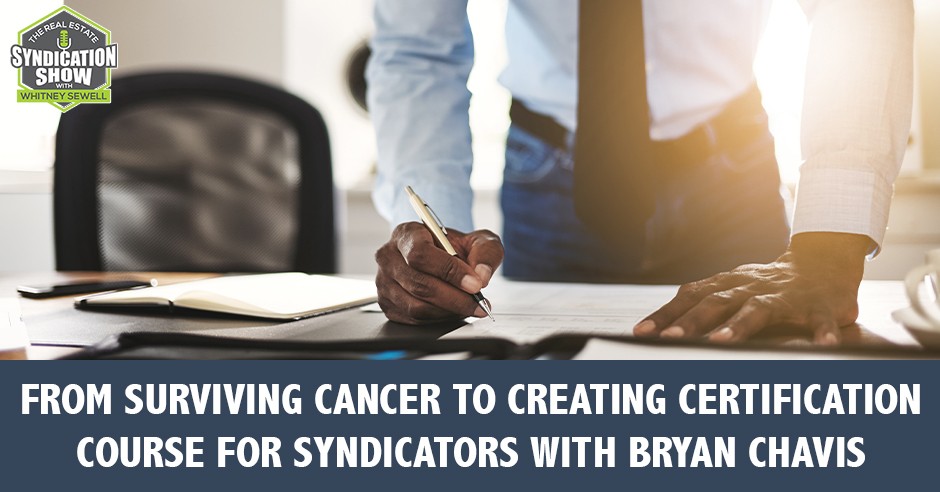Listen to the podcast here:
—
Watch the episode here:
From Surviving Cancer To Creating Certification Course For Syndicators with Bryan Chavis
Our guest is Bryan Chavis. Thanks for being on the show, Bryan.
Thanks for having me, Whitney.
I’m excited to have you on the show. I appreciate your time. I know you’re going to bring a lot of value to the audience. Bryan is a Simon & Schuster bestselling author and one of only a handful of authors with a real estate book in the US Library of Congress. He’s an award-winning coach and consultant, a recipient of the Bay Area Business Journal Top Entrepreneurs Award. He’s the Founder of Chavis Capital, Bryan Chavis Coaching and Consulting and The Landlord Academy. Above all, Bryan is a brain tumor survivor and he says, “Not a survivor but a thriver.” Bryan, thank you so much for your time. I’m looking forward to this. Give the audience a little more about who you are, what you’re up to in the syndication game and let’s dive in.
You touched all the key topics. I would only add that I’m an average guy. I’m an average high school student. I barely graduated. When people mention these accolades, I like to always let people know that it started from humble beginnings and a lot of hard work. Getting into the US Library of Congress and having these businesses and successful brands is possible for anybody to do. My schoolteachers back home will definitely second that. I’m just an average Joe.

What is your focus in the industry or what type of buildings are you buying? Are you focusing more on coaching? What are you working on mostly?
I love coaching. I focused on it because I feel like education and training is a calling of mine. However, there are two parts of who I am. There’s Chavis Capital and then there’s Bryan Chavis Coaching and Consulting. The Bryan Chavis Coaching and Consulting is always out there providing education, training and consulting to housing authorities, other REITs, private equity firms and your average investor. I’m always looking to bring the best in education and make that available to everyone. With the Chavis Capital, my focus there is multifamily. That’s what I know. That’s what I do. It’s all I’ve ever done. We’re aggressive. Our latest acquisition is in downtown St. Pete. We’re focusing on that. We’re focusing on finding more opportunities out in the marketplace and putting deals under contract. The race to 5,000 doors is our goal right now.
Let’s dive into that deal in St. Pete. Could you elaborate? Tell us a little about that.
That’s a deal I’m excited about. My partner, Mark Willis, the former CEO of Keller Williams who retired, we went in and knocked that project down. It was off-market. I was able to get it through techniques that I use, whether that be direct mail pieces or getting out there and building yourself a brand on social media. Someone reached out to me about this project and I felt like it still was undervalued. Most people thought it was priced right. Everything down there is trading right at the high-fours and mid-five caps. It’s trending towards the high-fours now. I paid cash for it and I probably paid market. I thought there was a lot of meat on the bone and I think a lot of people make a lot of mistakes because they look at buildings and look at pricing. They don’t understand prospect tenants’ demographics and psychographics. I study not necessarily buildings, but I study my prospect tenants’ demographics. The demographics tell you who the tenants are, the psychographics tells you their why.
[bctt tweet=”Buildings don’t pay rent, people pay rent. ” via=”no”]
When I understand the who and the why, I’m able to create a rent schedule or pro formas. I’m able to build a pro forma and have an idea of who our prospect tenant is and then I can see what type of improvements I can do to the building and how far I can take those improvements. Every improvement I do has a dollar amount associated with it. I knew exactly where I felt I could push these rents. Understanding who my prospect tenants’ demographics were, I felt like I knew where I could take these rents and that they were undervalued.
I had gotten into that market. I was the only one that pushed the rents past the $900 mark there. Now we’re well above the $900 mark. We’re in the $975, $985 with some select units a little over $1,000 with the amenities like the parking. Some units, I’m getting $1,100 for it. I like to say either I was crazy or I was crazy like a fox. I let others figure that out. For me, I take the guesswork out of it by understanding that I’m not buying buildings. Buildings have never paid me rent, people pay me rent. At the end of the day, my main focus is always on that prospect tenants’ demographics and psychographics. Understanding that and then I can find a product in the marketplace that fits those needs. Through the management of the property from the operational standpoint, bring in and put it in the right type of systems that it all comes together.
I like how you talked about understanding the who and the why. You mentioned, “We don’t buy buildings, we buy the demographics and we’re focused on the prospect tenants.” Can we dig into that a little bit? Help us to know how to understand the who and the why and why that’s important.
In my book, I talked about a process called the SEOTA process, which is the Strategic Evaluation Of a Target Area. It begins with the process of going through that process. Understanding that process is the study of building permit activity, average household size, average income, the demographics and psychographics and mortgage interest rates. I’m taking and compiling this information. What I’m trying to do is drill down to who my prospect tenant is. It’s no different than when you go to Walmart, CVS or Walgreens. Receipts used to be so big and now receipts are the length of your arm. The reason is that every time you go in and you’re buying something, they understand what you’re buying. That’s why they ask you for your phone number.

They’re associating what you’re buying with your number, creating a profile on who you are and then they’re able to offer these coupons based on the store on your needs, on their prospect tenants needs. They’re taking the guesswork out of, “How do we get this person back in the store?” They’re no longer guessing. They’re getting down to understanding what your needs are. If you’re going in there buying a lot of toothpaste, you’ll look at your receipt. You’ll notice that there’s a ton of ads that are giving you coupons based on toothpaste and the type of toothpaste you buy. You can go into one Walmart on one side of the ZIP code, go to another Walmart in another side of town and you’ll notice that the items on the shelves are different. It’s because they’re catering to that particular demographic.
I’m from Florida so we’re big on Publix. A lot of the groceries store chain moved their bakery from the back to the front. The reason why they did that is all based on demographics and understanding that when these individuals are coming into these stores, they are coming in hungry. They’re going to sell and move more of their products and services by placing the bakery upfront. Now you’ve got to walk past the bakery, smell the bread, smell the rotisserie cooking. It’s hard to bypass all that and go get the boxes or whatever you were going to get to make a quick meal at home and you end up buying that rotisserie. You multiply that by hundreds of thousands of people that come into the store on an hourly basis between a full day and you’ve up-sold someone on rotisserie $3 or $4. That means a lot.
Demographics and psychographics have always been around. It’s that our industry leaders like Walmart, Walgreens and these individuals have made a science of it and a lot of investors lose sight. There’s a difference between chess and checkers. It’s the same board but these are two different games. A lot of individuals approach real estate investing like it’s checkers. For the most part, you have to approach it like chess. You have to understand that buildings don’t pay rent, people pay rent. At the end of the day, most books, most gurus, most people focus on markets and buildings. I don’t want to talk about the building, I want to talk about my prospect tenants. At the end of the day, those are the individuals who are paying rent. Those are the individuals that I’m seeking after to make sure that they’re renewing and none of this is going to happen unless I’ve already anticipated their needs in advance.
What’s going to be my best resource for finding some of this information that we need to know?
[bctt tweet=”With the right amount of discipline, you can approach anything.” via=”no”]
In the beginning, you had to pay big dollars for this research. In the multifamily industry, we used to pay a company back in the day called Triad Research and Development. We used to pay tons of money for this. Nowadays, with Google searches, it’s just going in. If you go in and you were to Google your ZIP code, you’ll see a link come up called City-Data. It has a ton of recent information that’s free. Individuals can begin to peel back the layers of the onion and understand what the demographics are in the particular area that they’re looking to invest in. You’d go to your city websites like if you’re in the city of St. Pete or Tampa, you’re going to go to those sites. If you’re able to spend a little bit of money, there are other services that are out there that are available to investors. They are able to help you drill down and help with demographics and psychographics and pull up all types of information out there. For your audience, without spending money, you Google search ZIP codes and you’ll get a lot of that.
I want to change gears a little bit. We were talking about coaching and how in different industries, you have to have certification. As far as for syndicator, I’d never heard of a certification course for a syndicator. I wanted you to elaborate on that a little bit. Why is that beneficial and what does that do for us?
There are a ton of things. When I first got back into the space after 2012 being sick for five years, everyone’s talking about apartments. You can go back well before with my books in 2009. I was signed with Simon & Schuster. I’ve been talking about this for a long time. I’ve been doing this for a very long time before it became popular. It seems like there’s a boot camp or investor summit every week about multifamily. It wasn’t like that when I first got out. When I stepped back in, I noticed that and this is great for our industry, we love growth. However, the problem with growth is if we don’t hit the pause button, we’re going to say, “We’re creating all these syndicators but are we creating educated syndicators?” You’re talking about raising other people’s money, other people’s livelihoods. What credentials do you have? What experience do you have?
I know and understand that not everybody’s going to come from the industry like me and have this experience. How do I create a program or a certification that’s going to give these individuals the experience that they need and the confidence that they need? At the end of the day, if all hell breaks loose, I know I can run the property. I have tons of YouTube videos of me having to let the entire staff go and run 130-unit apartment building for a hedge fund by myself. I figured out the staff was stealing. They were incompetent. My father taught me long ago, I can do that all by myself. I let the staff go and I ran 133 units for a couple of days by myself. The idea is that if as a syndicator, you can’t do that and you don’t have that confidence, should you be raising people’s money?

I’m raising money from individuals outside of friends and family. Friends and family are probably the worst because they know where you live. “Should you be raising money?” is the question. I felt like there’s a need to give people training and education. I wanted to do it at a price point that made sense where they didn’t have to go to school and learn how to become an underwriter. They didn’t have to take all these finance courses and spend tons of money and years that they probably don’t have. I wanted to create a certification where individuals can put on their resume, the lenders could look at and say, “I’ve seen you’ve got some training and education.” They’ll notice that these individuals have been certified and keep up with their education and training on a continuous basis. I’ve seen a need and I decided to fill the need. It’s for myself as well. It always starts with myself and what I’m going to do for my team. It takes off to, “How can we offer that certification to others?”
What’s been the hardest part of the syndication journey for you?
After conquering a brain tumor, it’s tough to say that anything business-wise or business-related is tough for me. With discipline and the right amount and the right approach to anything, I’m cautious to say that the industry has been tough. It’s been an industry that has lent itself to give me a lifestyle. I really can’t say. I hope I’m not dodging the question. I’m grateful. Even if I have a bad day, I’m not raising money or we’re not finding deals, is it worse than my worst day? Is it worse than that day when I was diagnosed with a brain tumor? Is it worse than dealing with chemo? Is it worse than having seizures? No.
I appreciate that outlook. Your worst day is not near as bad as somebody else’s worst day. There’s always someone that got it worse. What is your best advice for taking care of investors?
It’s mastering your craft. Taking care of their money is the number one principle. Educating yourself and training yourself. That’s the number one thing. The principal thing is making sure that we as syndicators are well-versed and that iron sharpens iron. We’re all helping each other out and we’re all seeking out the best training and education possible that’s available to us and making sure that you’re keeping sharp in the industry.
Bryan, how do you like to give back?
It’s making sure that I share that story. I did an event with NuView and we signed a deal with the syndication platform that we have that takes care of the process. It’s making sure that I always let everyone know my story, where I came from, how I had to start over in 2012 after being diagnosed with this brain tumor and having to lose everything and come back after not having insurance. Making sure that I share my testimony is my way of giving back. If I can continue to lend my platform to organizations like yours where you’re doing the outreach that you have with adopting children. If I could figure out a way to be of service to others, then that’s what it’s all about for me.
Bryan, you’ve been a great guest. I appreciate you sharing your experience and expertise from being in the industry for many years. Tell the audience how they can learn more about you, the coaching and the certification and get in touch with you.
It’s BryanChavis.com. If you’re interested in investing with me in some multifamily projects, it’s ChavisCapitalRE.com. My YouTube channel is BryanChavis.com/YouTube. I’m shooting training and education videos every day. We’re announcing our new syndication platform partnership that we have so syndicators are able to handle the backend. We’re excited about this platform. We’re going to be doing a multifamily meetup every month. Whitney, I’d love for you to come to St. Pete. I’d put you up come to one of our meetups. I’d love to meet you there and have you out there. We’re doing a multifamily meetup every month in downtown St. Pete. These are areas where you can find me.
Bryan, thank you again for your time and being on the show. I enjoy getting to know you a little bit and hear more about your story and the amazing journey you’ve had. Congratulations on the success that you’ve had and coming back from losing it all. I appreciate the audience being with us every day. I hope you’ll be back. I hope you’re sharing and enjoying the show. Go to Life Bridge Capital and connect with me. I’ll help you in any way I can. We’ll schedule a call. Join the Facebook group, The Real Estate Syndication Show, so we can all learn from experts like Bryan and grow our businesses together. We’ll talk to each of you soon.
Important Links:
- Bryan Chavis
- Chavis Capital
- Bryan Chavis Coaching and Consulting
- The Landlord Academy
- Mark Willis
- City-Data
- NuView
- BryanChavis.com
- ChavisCapitalRE.com
- BryanChavis.com/YouTube
- The Real Estate Syndication Show – Facebook Group
About Bryan Chavis

Bryan is an award-winning coach and consultant.
Bryan is a new recipient of the Bay Area Business Journal top entrepreneurs award
Founder of Chavis Capital, Bryan Chavis Coaching & Consulting & The Landlord Academy
Above all Bryan is a brain tumor survivor… No Thrive!
Love the show? Subscribe, rate, review, and share!
Join the Real Estate Syndication Show Community:



